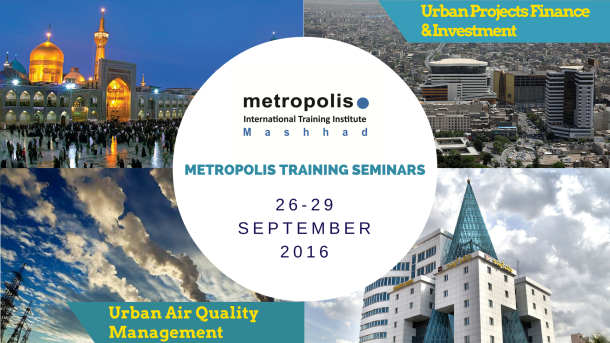INTERNATIONAL
CALENDAR
CALENDAR
 ISCO- Mashhad
ISCO- Mashhad
URBAN AIR QUALITY MANAGEMENT
Context:
On our planet, the air we breathe is one of the most important things around us. Clean air is something that we all need for good health and the well-being of humans, animals, and plants. Sadly, however, our atmosphere is being continuously polluted. Bad air quality affects human health as well as other environmental resources such as water, soil, and forests. Thus, air pollution also hampers development. Larger cities with highly concentrated industry, intensive transport networks and high population density are a major source of air pollution.
Many cities around the world, particularly in developing countries, are experiencing rapid growth and therefore included air pollution into their list of priority issues to be tackled. Aside from its severe local effects, urban air pollution also has profound regional and global impacts. Urban GHG emissions are major contributors to the problems of ozone layer depletion and ground level ozone, global warming and climate change.
An effective environmental planning and management process will help decision makers to formulate and implement realistic and effective strategies and action plans to improve air quality. These strategies and action plans have to systematically address the short and long-term causes of urban air pollution and help the city to achieve a sustainable growth pattern. At the end of the program, it is intended that participants (urban politicians, managers, and practitioners) should understand the significance of the urban air quality management and how to face the related challenges.
Objectives:
The objectives of the training seminar are to present the following subjects:
- Introduction to greenhouse gas (GHG) emissions
- Urban energy generation and use, and GHG and other pollution release
- Transportation's role in climate change
- Mitigation technologies to reduce greenhouse gases emission
- GHG emission reduction: World best practices (case studies)
- Urban air quality monitoring and assessment
- Urban air quality: hazardous air pollutants
- Air quality management and citizenship participation
- Socio-economic, health and well-being of the population
- Assess the extent to which experience is transferable from one country to another;
Target public:
- Policy makers
- Managers
- Local professionals
Pedagogic approach:
The aim of the training course is to raise questions and identify issues rather than to provide ready-made solutions. During the discussion which will follow the case study presentations and during the concluding session at the end of the program, delegates will be encouraged to challenge the presenters, contributing ideas based on their own experience or study and suggesting alternatives to the approaches which had been presented.
Language:
- English
- Persian
To participate at this workshop, please fill out the registration form or register online at: www.mtcm.mashhad.ir
|

